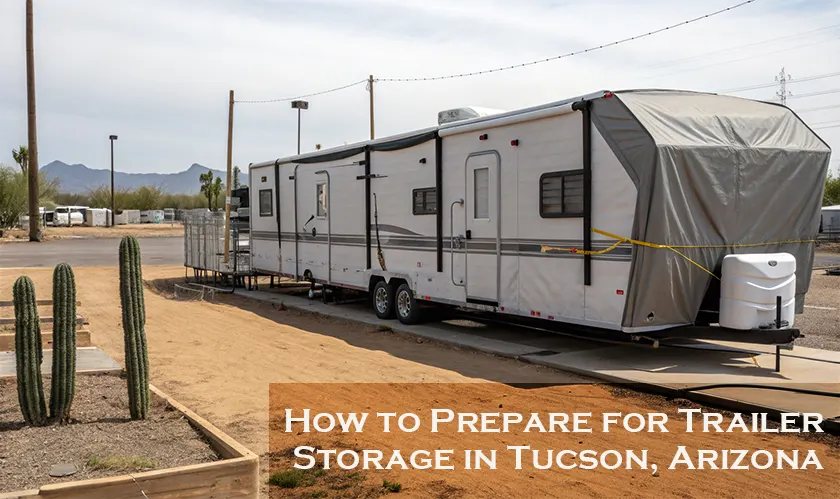Home Industry Travel and hospitality How to Prepare for Trailer Sto...
Travel And Hospitality

CIO Bulletin
27 September, 2025
Tucson, Arizona, is a city where outdoor adventures are part of everyday life. With its desert landscapes, wide-open highways, and proximity to national parks, trailers are a common sight. Many residents own travel trailers, utility trailers, or cargo haulers for work, camping, or recreation. But while owning a trailer opens the door to countless opportunities, it also raises an important question: how do you keep it safe when it’s not in use?
In this article, we’ll walk through the impact of Tucson’s environment, different storage options, preparation steps, and the legal considerations every owner should know. If you’re searching for trailer storage in Tucson, this guide will help you make the right choice for both short- and long-term needs.
Key Takeaways
Tucson’s desert climate poses risks such as UV damage, heat stress, dust, and heavy monsoon rains.
Pre-storage preparation prevents costly damage.
Storage options include outdoor, covered, and indoor climate-controlled facilities.
Security features and insurance coverage are essential for peace of mind.
Regular inspections help maintain your trailer’s condition while in storage.
Tucson’s environment is beautiful but unforgiving. Knowing the risks allows you to take preventative steps before leaving your trailer in storage.
Summer temperatures in Tucson often exceed 100°F. This heat can warp materials, damage rubber seals, and accelerate wear on mechanical components. Electronics, wiring, and batteries are also vulnerable when exposed to constant high heat.
The desert sun is especially harsh. Prolonged UV exposure causes paint to fade, seals to crack, and tires to deteriorate. To minimize this risk:
Use UV-resistant covers on exposed surfaces.
Apply protective coatings to paint, trim, and rubber parts.
Regularly inspect your trailer for early signs of sun damage.
Tires, brakes, and electrical systems are particularly vulnerable to heat. Prevent issues by:
Checking and adjusting tire pressure frequently.
Inspecting wiring and electrical systems for signs of melting or wear.
Using reflective covers or heat shields to protect sensitive areas.
Between July and September, Tucson’s monsoon season brings sudden downpours, flash floods, and strong winds. To prepare:
Park your trailer on elevated ground if possible.
Use waterproof covers and reinforced straps to secure it.
Remove loose outdoor items that could become projectiles in heavy winds.
Fine dust and sand are common in Tucson, and they can infiltrate trailer interiors, clog vents, and scratch surfaces. Reduce damage by:
Cleaning and waxing the exterior before storage.
Using breathable but dust-resistant covers.
Sealing vents and small openings where dust can enter.
Types of Trailer Storage Options in Tucson, AZ
When it comes to trailer storage in Tucson AZ, owners have three main options. The best choice depends on your trailer’s value, how often you use it, and your budget.
Outdoor storage is the most common option, offering open-air parking spaces for trailers.
Pros:
More affordable than other types
Easy access and maneuverability
Availability of larger spaces for oversized trailers
Cons:
Exposure to heat, UV rays, and dust
Requires additional protective covers
Cost: Typically $50 to $200 per month, depending on the facility’s location and security.
Covered storage facilities provide overhead protection with carport-style structures. While not fully enclosed, they shield trailers from direct sunlight and rain.
Benefits:
Reduces UV damage
Protects from hail, falling branches, or other debris
More affordable than indoor storage
Covered storage is an excellent middle ground for owners who want more protection than outdoor lots provide but don’t need full climate control.
For maximum protection, indoor climate-controlled storage is the top choice. These facilities maintain stable temperatures and humidity levels.
Advantages:
Prevents rust, corrosion, and moisture buildup
Protects high-value trailers, RVs, and collectible haulers
Provides the highest level of security
Cost: Typically $200 to $400 per month, reflecting the added protection.
Simply parking your trailer isn’t enough. Preparing it properly helps preserve condition and prevents damage.
Dirt, dust, and road grime can erode paint and finishes. Always clean thoroughly before storing. Use a gentle soap and avoid harsh chemicals that might strip protective coatings.
Tires often suffer the most when trailers sit unused. Prevent cracking and flat spots by:
Inflating tires to manufacturer-recommended PSI.
Covering tires to block UV rays.
Placing blocks or leveling pads under tires to distribute weight evenly.
Waxing painted and metal surfaces creates a barrier against the desert sun. Using a breathable, water-resistant cover adds an extra layer of defense.
Moisture control inside is just as important. Use desiccant packs or moisture absorbers to prevent mold and mildew. Remove food, valuables, and perishable items to deter pests and theft.
With dozens of options in and around Tucson, choosing the right facility requires comparing features, prices, and locations.
Reputable facilities often advertise:
Climate-controlled spaces
24/7 surveillance
Gated access with electronic entry
Customer service staff on-site
Choose a facility located near major highways or your home for convenience.
Storage prices vary by location, trailer size, and amenities. Many facilities offer discounts for long-term contracts or loyalty programs. It’s wise to compare at least three facilities before making a decision.
Security should be a top priority. Look for:
Continuous surveillance systems
Access control with keypads or cards
Well-lit lots with fencing
On-site security personnel at premium facilities
Trailer storage isn’t just about protection from the elements, you also need to meet legal and insurance requirements.
In Arizona, trailers must remain registered, even if they’re not actively used. Owners should:
Keep registration current through the DMV
Provide proof of ownership
Meet emissions or inspection requirements (if applicable)
Failing to register can lead to fines.
Even in storage, trailers are at risk of theft, vandalism, or weather damage. Comprehensive insurance is highly recommended. Consider policies that cover:
Fire and weather damage
Theft and vandalism
Trailer contents if valuable equipment is stored inside
Keep copies of:
Registration documents
Proof of insurance
Maintenance and inspection records
Having these on hand makes claims or disputes easier to resolve.
The Tucson desert is as tough as it is beautiful. While it’s the perfect setting for outdoor adventures, it can also be unforgiving on trailers that aren’t properly stored. By cleaning, maintaining, and preparing your trailer before long-term storage, you protect your investment from heat, sun, and dust.
Choosing the right type of storage; outdoor, covered, or indoor climate-controlled depends on your budget and the value of your trailer. For owners seeking peace of mind, investing in secure facilities for trailer storage in Tucson is a smart move. With proper planning, your trailer will remain in excellent condition and be ready for every road trip, job, or adventure ahead.
1)What are the best trailer storage options in Tucson, Arizona?
The main options are outdoor, covered, and indoor climate-controlled storage. Each offers different levels of protection and cost.
2)How do I protect my trailer from Tucson’s extreme heat?
Use UV-resistant covers, inflate tires properly, and consider climate-controlled storage. Regular inspections also help spot issues early.
3)What pre-storage steps are essential?
Thorough cleaning, tire maintenance, waxing, and moisture control inside the trailer are all critical.
4)How can I ensure my trailer is secure while in storage?
Select facilities with 24/7 cameras, gated access, and on-site staff. Adding insurance coverage further protects your investment.
5)Do I need to maintain insurance while my trailer is in storage?
Yes. Comprehensive coverage is recommended to protect against theft, weather, or accidents at the storage site.
6)What are the registration requirements for trailers in storage?
Arizona requires trailers to remain registered, even when not in use. Owners must keep paperwork and fees current.
7)How often should I inspect my trailer in storage?
Check at least once a month, especially during monsoon season, to ensure no damage has occurred.
8)Is outdoor storage safe in Tucson?
Outdoor storage can be safe if combined with proper covers and frequent inspections. However, covered or indoor storage provides greater protection from the harsh desert climate.

Insurance and capital markets







